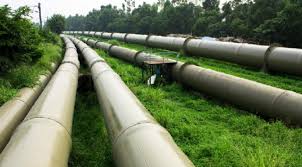Business
AfDB Predicts Robust Growth For Africa
Sub-Saharan Africa is likely to show robust 5.8 pe rcent growth this year with domestic demand playing a key role but business must do more to promote a more inclusive society, the African Development Bank said on Monday.
“We are looking at growth of around 5.8 percent this year in sub-Saharan Africa, excluding South Africa it would be 6.2 percent,” AfDB President Donald Kaberuka told our source in an interview on the sidelines of a business briefing.
Growth prospects for the region were “slightly higher’’ than 2012, Kaberuka added.
The World Bank forecasts growth of 4.9 per cent this year for sub-Saharan Africa, with South African growth seen at 2.7 per cent.
Growth in Africa has been strong in the past few years, compared with anaemic growth in much of the developed world.
The World Bank sees global growth at 2.4 per cent this year, with high income countries expected to see a rise of only 1.3 per cent.
Mining and resources only contributed around 30-32 per cent towards sub-Saharan African growth, Kaberuka said, with consumer demand, infrastructure, financial services and agri-business the other main contributors.
Kaberuka said he hoped to outline plans at the bank’s annual meeting in Marrakech in May for an infrastructure bond totaling up to 24 billion dollars, backed by the AfDB and bought by African central banks, to help investment in the region.
But the AfDB president told the briefing that in spite of rapid growth on the continent, Africa still suffered from too much poverty and wealth inequality and needed to make more progress towards creating an inclusive society.
“A lot needs to be done about equity…especially around natural resources management,’’ Kaberuka said, adding that AfDB calculations showed wealth inequality has been rising in Africa by around 1.5 percent a year since 2000.
“Sometimes it seems that the rent-seeking elites and the extractive industry business live off each other.
“Otherwise, how can we explain that a country pumps out two million barrels of oil a day and yet half live below the poverty line?’’
“Both policymakers and investors had their part to play in spreading wealth more evenly.
“Perhaps for too long we have been pointing fingers at governments, businesses have a responsibility here as well,’’ he said.
Business
Indigenous Refineries To Buy Crude Oil In Naira, Dollar -FG

The Federal Government on Monday complied with the demands of domestic crude oil refiners and other operators in the sector with a declaration that indigenous refineries can now buy crude oil in naira or dollars.
At a briefing in Abuja, where it unveiled the new template for domestic crude oil supply obligation, the Government, through the Nigerian Upstream Petroleum Regulatory Commission (NUPRC), also disclosed that the total crude oil and condensate reserves in Nigeria increased to 37.5 billion barrels as of January 1, 2024, with a life index of 68.01 years.
It stated that in compliance with the provisions of Section 109(2) of the Petroleum Industry Act 2021, the NUPRC in a landmark move, had developed a template guiding the activities for Domestic Crude Oil Supply Obligation.
The Chief Executive, NUPRC, Gbenga Komolafe, told journalists in Abuja that “The commission in conjunction with relevant stakeholders from NNPC Upstream Investment Management Services, representatives of Crude Oil/Condensate Producers, Crude Oil Refinery-Owners Association of Nigeria, and Dangote Petroleum Refinery came up with the template for the buy-in of all.
“This is in a bid to foster a seamless implementation of the DCSO and ensure consistent supply of crude oil to domestic refineries”.
On the currency of transaction for crude oil purchase, as approved in the new template, Komolafe stated that it would be either in naira or dollar, adding that naira transactions would free the pressure on the country’s foreign exchange rate.
The NUPRC boss also noted that the template had become effective because all necessary parties had signed up for it.
“The PIA intends to make the implementation (of crude oil obligation) very easy for the parties, both for the producers and refineries. So the answer simply is that the currency for the transaction would either be in naira or dollar. That is the simple answer.
“But we all know that if the transaction is carried out in naira, that itself will free the pressure on the exchange rate. That will help the exchange rate. So that is the intent and besides, the overall intent of the Petroleum Industry Act is to develop our midstream, which is a very laudable provision of the PIA”, he said.
In the currency of payment section of the new template, it was stated that “the payment shall be in either United States dollar or naira or both. Where the payment is in both currencies, the payment split shall be as agreed in the SPA between the producer and the refiner”.
On February 26, 2024, The Tide’s source exclusively reported that modular refineries in Nigeria were facing the threat of shutting down operations following their inability to access foreign exchange for the purchase of crude oil, a commodity priced in United States dollars.
Nigeria has 25 licenced modular refineries with a combined capacity of producing 200,000 barrels of crude oil daily.
Although not all of the plants are currently operational, the report stated that the functional ones were increasingly finding it difficult to purchase crude due to the foreign exchange crisis in the country.
The facilities, which produce Automotive Gas Oil, popularly called diesel, Dual Purpose Kerosene or kerosene, naphtha and black oil, were finding it hard to make the refined products available to oil marketers for distribution to consumers.
Operators of the plants explained that the scarcity of dollars had made it almost impossible for dealers to purchase crude oil, as the modular refinery players and oil marketers demanded the sale of crude oil in naira from the Federal Government.
The modular refinery operators, who spoke under the aegis of the Crude Oil Refinery Owners Association of Nigeria, lamented at the time that the Federal Government had not been able to keep its part of the bargain concerning the provision of feedstock to local crude oil refiners.
The Publicity Secretary, Crude Oil Refinery Owners Association of Nigeria (CORAN), Eche Idoko, had stated that modular refineries might close shop if nothing was done to ameliorate the situation.
CORAN is a registered association of modular and conventional refinery companies in Nigeria, while modular refineries are simplified refineries that require significantly less capital investment than traditional full-scale refineries.
Business
GEIL, NCDMB Train Nigerians On Oil, Gas Engineering

In compliance with the Nigerian Oil and Gas Content Development Act, Green Energy International Limited (GEIL), the operator of Otakikpo Marginal Field OML 11, Lekoil Oil and Gas Investment Limited (JV) in partnership with the Nigerian Content Development and Monitoring Board (NCDMB) has commenced the training of several Nigerians on oil and gas engineering.
The training is aimed at closing the skill gap in the oil and gas industry, with focus on the engineering sector, and is expected to deliver the required skill set necessary to meet the growing demand within the sector.
Speaking at the maiden edition held in Yenagoa, Bayelsa State, the Government Relations Manager at GEIL, Fatimah Mohammed Amate, noted that “The training will be delivered by Dexterous Applied Training Institute and will target several Nigerians from across various geo-political zones, and participants will be trained in the areas of Piping Engineering, Safety Engineering, Electrical Engineering, Health and Safety at the work place, Nigerian content awareness, among others”.
Also commenting, HRH Spriff Serena-Dokubo and Dr. Lyb Udochu, both Directors at GEIL, noted that the company’s commitment to the development of the oil and gas industry cannot be over emphasised.
According to HRH Serena-Dokubo, “The top five performing trainees will be offered employment immediately after the training”.
He further commended the leadership of the NCDMB for their coordination and synergy with GEIL towards the success of the training.
In his remarks, Dr. Lyb Udochu encouraged all participants in the programme to take the opportunity offered by the company seriously, adding that “over the years, GEIL hasensured that its core thematic areas are geared towards providing direct social investment programmes to address development deficits through employment, training and retraining, empowerment of women and youths, capacity building and skill acquisition, health outreaches, scholarships and direct community contracts”.
One of the beneficiaries of the training, Chimaobi Nwachukwu, highlighted the importance of the training, confirming that it would equip them with the competitive advantage necessary to excel in the oil and gas sector.
He said, “From my point of view, the programme would provide us with the required skill to be employable in the oil and gas industry and be more valuable to the society”.
Business
Nigeria’s Oil Reserve Grows By 1.4% To 37.5bll Natural Gas By 0.5%

The Nigerian Upstream Petroleum Regulatory Commission (NUPRC) has said Nigeria’s oil and gas reserves grew marginally in 2023 by 1.4 percent and 0.5 percent respectively.
NUPRC, in its annual national petroleum reserves position report, disclosed that as at January 1, 2024, revealed that oil reserves stood at 37.50 billion barrels compared to 36.966 recorded on January 1, 2023.
The reserve is made up of crude oil at 31.56 billion barrels and condensate oil at 5.94 billion barrels.
For natural gas, the Commission said reserves stood at 209 trillion cubic feet as at January 1, 2024, compared to 208.83TCF recorded over the corresponding period last year.
The gas reserve is made up of 102.59TCF of associated gas and 106.67TCF of non-associated gas.
At a press briefing in Abuja, the Chief Executive, NUPRC, Engr. Gbenga Komolafe, explained the growth of oil and gas reserves came from the contributions from the development of brown fields which were given out through the marginal field awards.
On the move to ensure that domestic refineries have enough crude oil for refining, Komolafe said a new template for domestic crude oil supply obligations has been released and has also become effective.
He stressed that with domestic crude oil supply obligations in place, he expects Nigeria to become self-sufficient in the supply of petroleum products when the Dangote and NNPC refineries come on stream fully in the second of the year.
“The strategic initiative aligns with the policy of the current administration and the declaration of President Bola Ahmed Tinubu that Nigeria is ready for business. Mr. President, as part of his fiscal policy, vacated barriers to investment in the oil and gas sector.
“Furthermore, this aligns with Nigeria’s commitment to bolstering domestic refining capacity and ensuring the sustainability of its oil industry.
“The template provides a transparent framework aimed at fostering collaboration among stakeholders for a thriving energy sector”, he said.
He disclosed that the template resolved about ten issues affecting crude supply to local refineries including load allocation and currency of payments.
Komolafe explained that the currency of payment will be mixed, adding “(a) the payment shall be in either United States Dollar or Naira or both, (b) where the payment is in both currencies, the payment split shall be as agreed in the SPA (Sales and Purchase Agreement) between the Producer and the Refiner”.
-

 Oil & Energy3 days ago
Oil & Energy3 days agoTroops Recover N637m Worth Stolen Crude, Arrest 36 Suspects
-

 World3 days ago
World3 days agoBreathtaking New Paintings Found At Ancient Roman City
-

 Politics2 hours ago
Politics2 hours agoNigeria Not Ripe For Diaspora Voting -NBA Chieftain
-

 Maritime3 days ago
Maritime3 days agoNigerdock Assures Host Communities On Robust Relationship
-

 Sports3 days ago
Sports3 days agoGhana Legend Names Okocha Africa’s Best
-

 News3 days ago
News3 days agoNDLEA Recovers 900,000 Opioid Pills, 1,347.4kg In Seven States
-

 Nation3 days ago
Nation3 days agoAkpabio Meets South-South APC State Chairmen, Charges Them On Party Unity
-
Politics3 days ago
Islamic Leaders Blame Nigeria’s Woes On Leadership Failure

